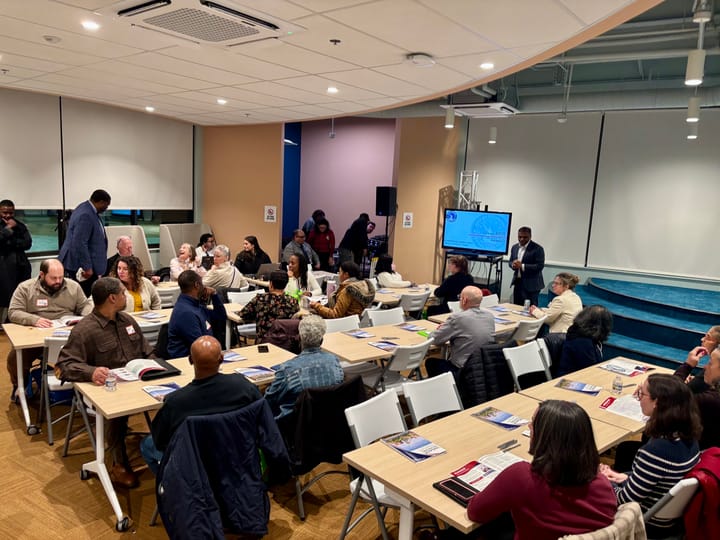
Richmond officials set to choose between two competing ideas for a FOIA library
After Richmond City Councilor Kenya Gibson (3rd District) introduced legislation creating a Freedom of Information Act library to bring more transparency to local government, Mayor Danny Avula is now pushing a FOIA library concept of his own.
With two competing proposals on the agenda, the City Council will have to choose between the more comprehensive records library Gibson envisions or a narrower version proposed by Avula that would give city officials greater discretion over what documents to publish.
Neither plan would require the city to release more government records than it currently does. The city could still avoid publishing sensitive documents by invoking the wide variety of FOIA exemptions in Virginia law. The legislation only requires the city to make released records more widely available by publishing the documents online.
Avula and numerous Council members campaigned last year on boosting transparency at City Hall and have continued to tout openness with the public as a priority. The FOIA library debate this fall will force policymakers to decide just how much transparency they’re comfortable with.
“I ran with the belief that we can transform our city’s government to truly meet the needs of its residents through radical transparency. I still believe that,” Gibson said in a statement to The Richmonder. “In this case radical transparency means, if one member of the public has information — we all do. And that helps our ability to ask more questions and get additional information.”
Both ordinances will be taken up Wednesday afternoon at a meeting of the Council’s Governmental Operations Committee.
Gibson has pushed for a FOIA library as broad as possible, pushing back against the Avula administration’s assertions the city should approach the topic with caution and enact rules limiting what kind of documents should be published in the library.
The administration, in turn, has portrayed Gibson’s concept as impractically broad and potentially a source of new legal risk to the city.
Avula called his FOIA library plan “another step toward earning and keeping the public’s trust.”
“As a public health doctor and now, as mayor, open communication and transparency have always been the bedrock of my work. This initiative is an extension of those values,” Avula said in a news release about his legislation.
At one point, it appeared Gibson and the Avula administration would be working together to try to refine Gibson’s proposal into something the mayor’s team could support. That apparently hasn’t worked out.
The Avula administration announced its own proposal in an Oct. 10 news release, saying it “will build on work that’s been underway for a year.” The release didn’t mention Gibson’s pending legislation that was introduced Sept. 8.
How the two versions differ
After the administration raised concerns that an all-encompassing FOIA library could require the city to publish law enforcement records with disturbing content or records involving minors, Gibson amended her legislation to exempt many documents related to public safety and social services. The amended version would also allow the city not to publish records in the library when people file FOIA requests about themselves or their minor children.
Gibson’s amendment would dramatically reduce how many of the roughly 5,500 FOIA requests the city receives each year would end up in the public FOIA library. However, the Avula administration is still arguing its proposal is better because it gives the city more flexibility to adapt to novel FOIA situations officials haven’t encountered or thought about before.
Under the administration’s FOIA library, the city would only publish documents that fall under a to-be-determined “rubric” laying out what records are and aren’t suitable for broad release. The administration has indicated its library would include documents requested by two or more people that pertain to the “public interest” or are “central to government operational accountability.”
City communications director Ross Catrow, whose office oversees the handling of FOIA requests, said he’s been working on the FOIA library concept since before Avula and first-term Council members took office early this year.
“FOIA requests can be pretty complex, and we want to make sure the rubric for what’s included in Richmond's FOIA library strikes the right balance between protecting our residents and their information and giving the public the easiest possible access to government documents,” Catrow said. “We think our FOIA library ordinance strikes that balance well.”
In a presentation set to be delivered to the Council committee Wednesday, the administration will also raise concerns about the possibility of the FOIA library containing “weaponized FOIAs that are intended to embarrass residents or staff.”
As written, Gibson’s proposal appears to require the city to publish requests the city receives, regardless of whether officials have any documents relevant to the request. That means the city could end up amplifying an accusatory but ultimately baseless FOIA request, but anyone reading the request in the library could also see there were no responsive records.
It’s not clear how the administration’s proposal would draw a distinction between FOIA requests meant to hold staff accountable versus requests meant to embarrass staff.
Gibson suggested her proposal would avoid empowering the city to make those types of judgment calls.
“There is no reason to codify a FOIA library where City Hall has discretion in what it can include,” Gibson said. “Cherry picking what information we think merits public interest is essentially how the city has always operated.”
The Avula administration initially claimed Gibson’s proposal would require the city to hire three full-time FOIA librarians at a potential cost of $350,000 per year. After Gibson’s amendments, the administration now contends her proposal would still require the hiring of one librarian at about a third of the original cost estimate. The administration says the mayor’s version would have no cost.
The Richmonder is powered by your donations. For just $9.99 a month, you can join the 1,200+ donors who are keeping quality local news alive in Richmond.
A dispute over legal liability
The FOIA library discussion has already produced one tense moment in the City Council chambers.
At an initial hearing last month, Gibson invoked the pending lawsuit former FOIA officer Connie Clay has filed against the city. Clay claims she was wrongfully fired for insisting that Richmond properly handle FOIA requests, an allegation the city disputes. Nevertheless, Gibson said “the optics in this case are not good.”
“The goal, I think, is to transform the perception of City Hall,” Gibson said.
Chief Administrative Officer Odie Donald II, an Avula hire, indicated to Gibson she should not have spoken publicly about a pending legal matter.
“I’m not comfortable at all talking about litigation. I’m not sure why we did that,” Donald said. “That is quite dangerous for the city, especially for the body that is in charge of ensuring we remain fiscally responsible.”
Donald then said Gibson’s FOIA library proposal could potentially “increase the liability to the city.”
In response, Gibson said FOIA is a tool meant to empower the public, not to protect governments from lawsuits.
“At the end of the day, we are required to govern publicly,” she said. “That is the letter of the law.”
Megan Rhyne, a transparency advocate who serves as executive director of the Virginia Coalition for Open Government, made a similar point in a recent newsletter about Richmond’s FOIA library debate. Any information that would go into a FOIA library, she noted, is by definition already considered public.
“It’s true. Information released through FOIA — in the form of records — could be used against the government,” Rhyne wrote. “A citizen, a business, a lawyer could get hold of public records that show the government was negligent about something, somewhere, some time. But that’s kind of the whole point, right?”
Contact Reporter Graham Moomaw at gmoomaw@richmonder.org






